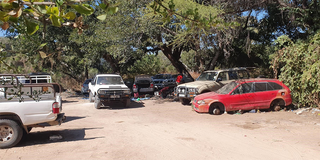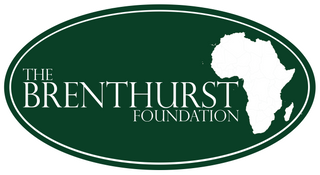News
The Name is Banks, Banks Banks - Finding Agent of Mercy on the Banks of the Okavango
The frictions of African travel are increased along the way by the seemingly endless number of police checkpoints: 31 in the 790km from Dedza in Malawi to Machipanda, and 15 in the 685km from Machipanda to Plumtree. There may be a new African-doing-business index in this, where the quality of governance is inversely proportional to the number of roadblocks.

What a difference good people make.
The 100km of ravaged road south of Shakawe in the northwestern corner of Botswana had yielded our first “mechanical”. Oil was spraying out of the Land Cruiser's rear wheel. The helpful petrol attendant pointed us towards the local spares shop. “They can help,” he said, encouragingly.
Having completed my assignment in Malawi, it had seemed a good idea to drive back via Zimbabwe, Botswana and Namibia, avoiding the paralysing effects of the potholes and police roadblocks experienced on the way up in Mozambique. (You can read about that journey here)
Regardless, the border posts are special. Perhaps it's Covid-19, which undoubtedly layers bureaucratic procedure, but there seems much more to it.
After a day of dodging potholes through Mozambique's Manica Province, the Machipanda-Forbes border into Zimbabwe was telegraphed by the 6km queue of trucks in the run-up: we counted more than 200 trucks waiting their turn to pass. Inside the Mozambique side was a flurry of agents, papers and immigration and customs officials, none of whom apparently knew where to stamp our carnet.
Never mind, it was all friendly enough, which could not have been said for the Zimbabwe side.
Despite having been given pre-authorised special travel permission (needed during Covid-19 apparently), doubt was immediately cast on this letter as it was “a print-out, not the original”. Our pre-arranged one-legged agent, David, was helpful, but it was a seriously bewildering process. We went from a Covid-19 check to a window marked “cooldrinks for sale” inside which typed a surly immigration official with four stripes on his shoulder boards, to four other stops for immigration, customs, insurance and the carnet stamp.
At the gate, finally, a large man stretched into a blue onesie declared he had to X-ray the entire contents of the car. On opening the back, he spotted a bottle of scotch in a bucket tucked together with bars of chocolates. Before you could say “malt!”, these went, quickly, the back being slammed closed, and we were told to be on our way with our grudgingly issued three-day “visa”.
It was a thoroughly alienating experience even for the hardened and streetwise traveller. The chaos and multi-stop procedures can conceivably only help the spread of the virus.
Two-thousand-five-hundred kilometres of journey later, the reaction of the chilled Botswana border officials, operating in the pleasant fading winter heat under the tattered umbrella at Mohembo, was revealing. “Why do they do that?” one asked on hearing the Machipanda experience. “Don't they want you to visit their country and spend money?” Her Namibian counterpart a hundred metres further on said, after asking how many days we would be staying, “why so short?”
But Botswana too, for all of the positive narrative about its infrastructure and officialdom, has some catching up to do. The roads are poor to the point that, between Shakawe and Gumare, we were more off than on-road. And the border procedures can be onerous and mildly predatory.
Leaving Zimbabwe at Plumtree with a fresh Covid-19 test, for example, involved the following: first, we handed these results on request to the immigration officer. She sent us to the Covid “cage” where we were given two stamped pieces of paper (which no one ever checked again) and told to go back to the passport officer, who stamped our passports and gave us a stamped gate pass. Next, it was to the Revenue Authority “shed” where the officer stamped the carnet (once she had been shown where it should be stamped), and similarly stamped our gate pass (only once we had returned from the gate without her stamp). We were then on our way to the Botswana side.
Parking instinctively where several cars were gathered, outside a prefab and a tent, we proceeded into the former, where we were told to wash our hands outside, even though there was no water. Fetching gel from the car, which we were then told to move, we tried again. Our Covid-19 results were checked, and we were sent off with double-sided forms to complete. On returning them, our results were checked again, temperatures taken and marked on the form.
We were then sent to an army tent, reissued two different forms, and asked to show our Covid test once more. We then were instructed to sit and wait to take a rapid antigen test, apparently routine for all travellers. After waiting for the result, we resubmitted these with the new set of forms and the original test to the woman in the prefab who told us to go to immigration. There we were asked — you are getting it now — for our Covid test, and our forms were stamped, along with the gate pass, and we were told to go to… customs.
Again, I had to explain the carnet system to the officer, and it was stamped without fuss. Outside we queued in the car before a large dip. Once at the front, we had to report to another officer at the front of the dip, who asked to see our passports (shown also at every stage above) independently, and our details were written down. We then had to take all shoes out of the car and dip them in a small puddle to the side, along with those we had on. We were then informed the whole car was going to be inspected, which they did, taking out bags, boxes, flicking through books (no side sales sadly), pulling apart boxes, undoing my bike bag, checking in my boxes of spares and tools, and even opening the cooler box.
All the above was in good(ish) humour, apart from requests to “give me the car”, but another two hours and 15 stages (I think) of messing around.
Borders are an excuse for employment, revenue, formal and informal strangleholds on business, ramping up the cost of doing business in Africa in the interests of an elite. The frictions are increased along the way by the seemingly endless number of police checkpoints: on this occasion, 31 in the 790km from Dedza in Malawi to Machipanda, and 15 in the 685km from Machipanda to Plumtree. This number fell dramatically in Botswana, and further in Namibia.

There may be a new African-doing-business index in this, where the quality of governance is inversely proportional to the number of roadblocks.
But memories of all this friction faded in Shakawe on the banks of the Okavango.
Armed with the information about the sole source of Shakawe's motor spares, we tried them for advice on what I thought to be our Cruiser's problem — a rear axle seal. They sent us to a man changing tyres (not much help) and he to a man called, I thought I heard, “Benz”. We found him eventually, working in the dust between broken cars and other scrap down a panhandle. He immediately confirmed the fault, said he would help to get us on our way if we could find the part.
Back to the spares place, but to no avail. The Cruiser was then quickly jacked up and disassembled in the dirt. The diff was pulled apart, the offending seal removed, a spring tightened and reinserted, and all put back together again amid a stream of war stories of cars and escapades, of modifying 1400 bakkies with VR6 engines and BMW gearboxes of which the local police, unsurprisingly, took a dim view.
He had dropped everything, quite literally in the dirt, to help us along our way. And he really knew what he was doing, even to the relatively trained eye.
His name was not Benz, as I had first thought I had heard, but Banks. His surname, too, was Banks. Banks Banks of the Okavango.
Three hours later we were back on our way, the repair (just) enough to get us to our filming location at the old 32 Battalion base over the border near Divundu, and onwards to Rundu and a Toyota agent.
Covid-19 makes all travel difficult and travellers hesitant. As the leisure taps will, eventually, turn back on again, regional tourism is inevitably going to become more important, given fears of flying. For governments, the premium will be on reducing the frictions to benefit from this growth. I can certainly recommend the banks of the Okavango.
This article was originally published on Daily Maverick. (Photo: Greg Mills)


